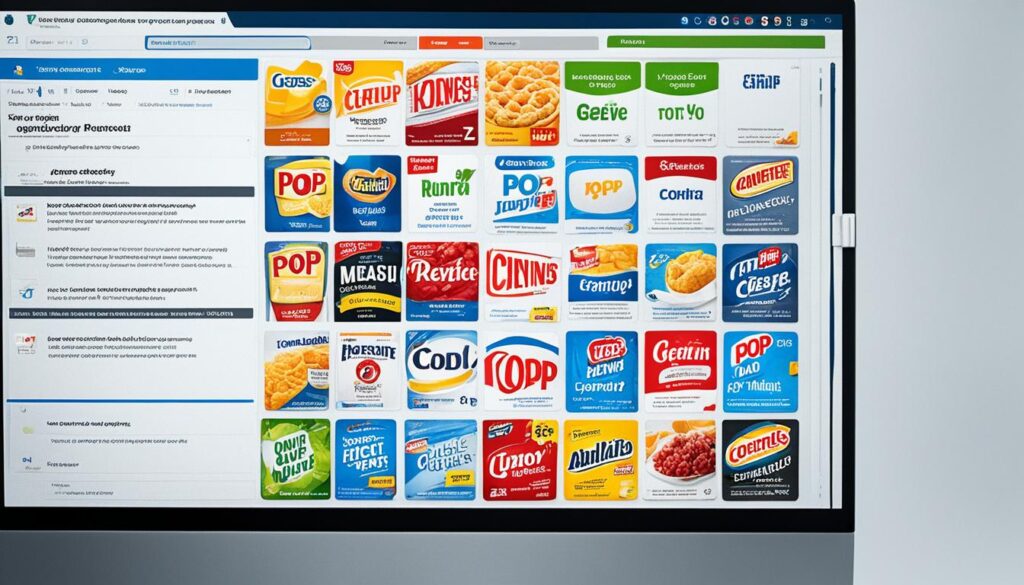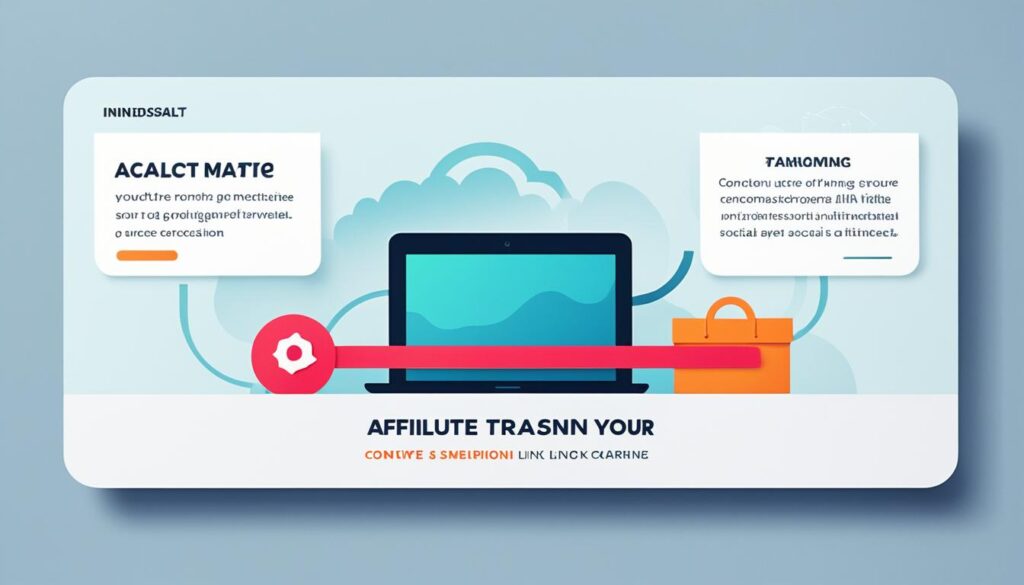Affiliate marketing can seem tricky because of all the special terms used. It’s important to know these terms to do well in the field. In our glossary, you’ll find the key terms of affiliate marketing clearly explained.
Are you new to affiliate marketing, or are you looking to brush up on your knowledge? Either way, this glossary is here to help. You’ll learn everything from the basics like redirects to more detailed concepts like the role of advertisers and alt text. With this guide, you’ll get familiar with the lingo of affiliate marketing.
Ready to learn more about affiliate marketing? Let’s take a closer look at the terms that will help you succeed in this industry.

Key Takeaways:
- Affiliate marketing is an industry with its own unique language
- Understanding key terms and definitions is essential for success
- Affiliate links are used to track and credit affiliates for their traffic
- 301 and 302 redirects are important for properly directing traffic
- Above the fold content is crucial for engaging website visitors
301 Redirect
A 301 redirect is a permanent move from one URL to another. It helps website owners ensure visitors and search engines go to the right URL. It’s great when changing your website’s URL structure or updating old pages.
With a 301 redirect, users and search engines find the new URL without hitting dead ends. This improves user experience and helps search engines rank your updated URL better.
“A 301 redirect allows website owners to maintain the traffic and search engine visibility of a page even after it has been moved or replaced.”
A 301 redirect tells browsers and search engines that a URL has moved permanently. When someone tries to access the old URL, they get sent to the new one automatically. This happens without needing to do anything manually.
To set up a 301 redirect, you need to change your server settings. This tells it to send requests from the old URL to the new one. You can do this through server-side coding or with tools from CMS platforms like WordPress.
Benefits of 301 Redirects:
- Preserves search engine rankings: A 301 redirect keeps the search engine rank of an old URL when moved to a new one. This helps keep your site visible and performing well in search results.
- Enhances user experience: Redirecting visitors to the new URLs keeps them from finding broken links. This makes their time on your site better.
- Consolidates link equity: If you have several URLs for similar content, a 301 redirect can merge their link value into one URL. This improves the authority and rank of that URL.
A 301 redirect works before the page even loads, offering a smooth transition. This gives users and search engines the new URL right away, without waiting or trouble.
Using a 301 redirect well can tidy up your URL structure and fix broken links. It ensures that everyone always finds the right page on your site.
302 Redirect
A 302 redirect temporarily moves a URL to another. It differs from a 301 redirect, which is permanent. This means search engines might keep the old page or switch to the new one. Using the right redirect is key to preventing traffic loss.
Search engines understand a 302 redirect is temporary. They know the original URL might come back later. This redirect works well for short-term changes or to send visitors to another page temporarily.
One common use for a 302 redirect is during website updates or maintenance. This avoids showing an error page. Instead, visitors see a temporary page with useful information or a special message.
However, search engines may see a 302 redirect in varying ways, which can affect your ranking. They might not swap the old page out for the new one right away.
Choose your redirect type wisely for your needs. Use a 301 redirect for permanent moves or URL changes. A 302 redirect suits temporary needs or when you might go back to the original URL.

Comparison of 301 and 302 Redirects
| 301 Redirect | 302 Redirect |
|---|---|
| Indicates a permanent move | Indicates a temporary move |
| Search engines update their index with the new URL | Search engines may keep the old page indexed or replace it |
| Recommended for permanent URL changes, website migration, or rebranding | Useful for temporary redirects, maintenance pages, or testing |
Above the Fold
In web design, “above the fold” means the part of a web page you see first. It’s what users see right away, without scrolling. This area is essential for grabbing attention immediately.
Having great content in this area is key to keeping visitors interested. It’s your chance to show off your brand and message. You must make a strong first impression in these crucial seconds.
Your website’s purpose should shine through above the fold. It should look great and be easy to get around. This encourages people to stay, explore, and eventually do what you hope they’ll do.
Keep these ideas in mind for your content:
- Clear and concise messaging: Make your main points quickly with headlines that catch the eye. The text should be brief and easy to look over.
- Eye-catching visuals: Use top-quality pictures or graphics related to your topic. These visuals can get attention and make a good first impression.
- Strategic calls to action: Put easy-to-see and attractive calls to action (CTAs) in place. They should make users want to sign up, buy, or learn more.
- Key information upfront: Present important details, like features, benefits, or prices, right away. This gives immediate value and encourages further exploration.
But remember, there’s no universal solution for optimizing above the fold. It demands regular testing and adjustments based on how users behave. Analyze your site’s performance in this area and improve it step by step for the best outcomes.

Why is Above the Fold Optimization Important?
“Optimizing the above the fold area is vital. It influences if users stay on your site or leave quickly. By making the most of this key space, you can catch their eye, leave a good impression, and boost your chances of getting them to act.”
Optimizing above the fold can create a strong impact on your site’s visitors. From the start, you can earn their trust, share your brand’s worth, and encourage action.
But it’s more than just looking good. It’s about a smooth experience that matches your business aims. So, crafting an engaging above the fold experience is worth your time. It draws in your audience and spurs them to dig deeper.
Advertiser
An advertiser is crucial in the affiliate marketing world. They own products or offers and are important for driving sales. Advertisers reward affiliates for conversions, like sales, clicks, or leads. They use ad networks to get traffic and boost their products through affiliate marketing.
To adopt an advertiser mindset, it’s key to understand the need for quality affiliates. These partners can effectively push your offers. By working with affiliates, advertisers gain from the affiliate’s expertise and their knack for bringing in traffic. Affiliates, in return, get paid commissions for helping advertisers meet their goals.
Are you an advertiser looking to maximize your reach and boost your sales? Affiliate marketing is a great way to grow your customer base and increase conversions. It allows you to connect with a large network of affiliates. These affiliates can then promote your products to a larger audience.
“Affiliate marketing allows advertisers to benefit from the expertise and reach of affiliates, resulting in increased sales and brand exposure.”
Advantages of Being an Advertiser in Affiliate Marketing
Being an advertiser comes with several benefits in affiliate marketing:
- Increased Reach: Working with affiliates allows you to reach more people.
- Cost-Effective: You only pay for actual conversions, which saves money.
- Targeted Marketing: Affiliates often focus on specific areas, helping you reach the right audience.
- Performance-Based: Paying for conversions means both you and the affiliates are motivated to do well.
- Brand Exposure: Affiliates boost your visibility by promoting your products in various places.
A successful advertiser knows the importance of strong affiliate relationships. Providing resources and support helps. Rewarding their hard work creates a win-win partnership that enhances sales and conversions.
Advertiser vs. Affiliate
| Advertiser | Affiliate |
|---|---|
| Owner of the product or offer | Promotes products or offers |
| Pays affiliates for conversions | Earns commissions for conversions |
| Uses ad networks for traffic | Drives traffic to advertiser’s products |
| Provides promotional resources to affiliates | Utilizes affiliate links to track conversions |
| Improves marketing strategies | Promotes advertiser’s products |
Understanding the advertiser’s role helps leverage affiliate partnerships. This boosts conversions, raises brand visibility, and meets marketing goals.

Adware
Adware is often known as “spyware.” It’s a type of program downloaded without the user’s knowledge. It shows unwanted ads and removing it can be hard. Adware harms the user experience and is not liked in affiliate marketing.

Adware is a big problem online. It gets into devices without permission, often with other legitimate software. It might look like it’s useful.
Once it’s on your device, adware tracks what you do online. It gathers personal data and shows annoying ads. These ads can slow down your device and make websites hard to use.
Adware is dangerous for your privacy and safety. It might lead to stolen identity or data. It can also slow down your device and make it perform poorly.
Getting rid of adware is tough. You usually need special tools or antivirus programs. But, some adware is stubborn and hard to completely remove.
In affiliate marketing, adware is bad news. It ruins the user’s experience. Affiliates work hard to make sure ads connect well with their audience. Adware disrupts this and breaks trust.
To keep users happy, affiliates need to focus on quality and honesty. Promoting good products and following the rules builds trust. This makes affiliate marketing more effective.
Affiliate Link
An affiliate link is key for successful affiliate marketing. It’s a special tracking code. It shows that a visitor comes from a specific affiliate site. This link can be in a text or image, allowing tracking of clicks. Affiliates get credit for the traffic they bring, leading to commissions.
Affiliate links are essential in the affiliate marketing world. They help track sales and link them to the right affiliates. This helps advertisers see how well their campaigns are doing. Affiliates get rewarded for their hard work.
You can find affiliate links in different forms like text links, banners, or buttons. Each link has a special code that tracks sales back to the affiliate. This ensures affiliates get credit for their efforts.
Here’s an example of an affiliate link:
When people click an affiliate link, they go to the advertiser’s site. At the same time, the affiliate network keeps track of this. They record any sales made, making sure the affiliate is rewarded.
Affiliate links connect affiliates and advertisers. They let affiliates earn by sending traffic and making sales. The tracking feature of affiliate links is key. It measures and rewards the success of affiliates.

Affiliate Marketing Forum
An affiliate marketing forum is an online community for users. Here, you can find information, resources, and discussions on affiliate marketing. This platform lets affiliates connect, share experiences, ask questions, and learn from experts.
Joining an affiliate marketing forum is great for keeping up with the latest trends and strategies. These forums are knowledge hubs. They help affiliates network with others who love affiliate marketing.
These forums discuss a variety of topics. You’ll find talks on strategies, tips, specific affiliate programs, and networks. Here, members share success stories, ask for advice on challenges, and learn from seasoned affiliates.
Forums are more than just information sources; they build community. They allow you to meet others, form relationships, and find collaboration opportunities. You’ll see new viewpoints, grow your knowledge, and better understand affiliate marketing by participating.
Some forums offer extra resources like e-books, video tutorials, and case studies. These can help deepen your understanding and improve your strategies.
Benefits of an Affiliate Marketing Forum:
- Access to valuable information: Stay informed about the latest trends, strategies, and updates in the affiliate marketing industry.
- Networking opportunities: Connect with other affiliates, industry experts, and potential partners.
- Knowledge exchange: Share your experiences, learn from others, and collaborate on strategies and opportunities.
- Problem-solving: Seek advice and solutions from the community when facing challenges or obstacles in your affiliate marketing journey.
- Exclusive resources: Gain access to e-books, tutorials, and case studies that can further enhance your skills and knowledge.
Active participation is key in an affiliate marketing forum. Join the discussions, ask questions, and share your insights. With the forum’s collective wisdom, you’ll navigate the ever-changing world of affiliate marketing more easily.

Affiliate Program
An affiliate program is a setup where advertisers pay affiliates. This is for clicks, sales, or leads from their website. These programs are also known as partner or referral programs. Affiliates get rewards for bringing traffic and making sales.
Affiliate programs are great for businesses wanting more customers. They work with affiliates to use their online space for promotions. It’s a way to sell more by using the affiliate’s audience.
When joining, affiliates get a special link. This link tracks sales or visits they bring. It helps figure out their commission.
Affiliates can earn by promoting items on their site. They pick products that fit their readers. They get paid per sale or click through their link.
Affiliate programs benefit both advertisers and affiliates. Advertisers get more customers without paying upfront. Affiliates earn by directing traffic. It’s beneficial for both, helping them grow.
If you’re looking to join or start an affiliate program, many platforms can help. These platforms connect advertisers with affiliates easily. It’s a good starting point for both parties.
For advertisers and affiliates, being part of an affiliate program is promising. By joining forces, you can increase your online impact and profits.

| Pros of Affiliate Programs | Cons of Affiliate Programs |
|---|---|
| 1. Cost-effective marketing strategy | 1. Requires ongoing effort and dedication |
| 2. Potential to reach a wider audience | 2. Competition from other affiliates |
| 3. Performance-based compensation | 3. Dependence on the advertiser’s website performance |
| 4. Opportunity to earn passive income | 4. Possibility of commission disputes |
| 5. Flexibility and scalability | 5. Need to comply with advertiser’s terms and conditions |
Alexa Rank
Alexa Rank is a platform that tells us how websites rank based on user activity. It shows how popular a site is through its traffic. Sites with lower Alexa Ranks are seen as more popular.
This tool gives a number to each site based on things like page views and unique visitors. It helps owners and marketers see where their site stands online. They can then work on making their site more visible and visited.
With Alexa Rank, you can:
- Watch how your site does over time
- Keep an eye on your competition’s ranks and visitors
- Look for chances to work with high-ranking sites
- Learn about what users like and follow
If you run a website, work in online marketing, or manage a site, Alexa Rank can help. It offers data to make your site better. Knowing your site’s rank helps you focus on making it more popular and getting more visitors.

“Alexa Rank is great for seeing how your website does against others. It shows how well-liked your site is and where it can get better.” – Website Owner
Alexa Rank Features
Alexa Rank has several features to help you use the ranking data well. Here are some key features:
- Global and Country Rankings: Alexa Rank shows how your site does around the world and in certain places. This helps you see your global and local standing.
- Competitor Analysis: You can see how your site ranks compared to others. This tells you where you fit in your industry and what you can improve.
- Historical Data: Alexa Rank lets you look at your site’s history. You can see trends and changes over time.
- Website Analytics: Alexa Rank also gives traffic estimates and insights into who visits your site. This helps you understand your audience better.
Want to improve your site’s ranking, check out your competitors, or know your audience better? Alexa Rank is key for understanding web analytics.
| Advantages of Alexa Rank | Disadvantages of Alexa Rank |
|---|---|
| Shows how popular websites are with numbers | May miss the mark for sites with few visits |
| Allows you to compare your site with others | Only counts users with Alexa tools |
| Provides rankings for both the world and specific areas | Ignores sites not followed by Alexa |
| Uncovers chances for business deals | Rank can be skewed by paid visits or bots |
Alt Text
Alt text stands for alternative text, and it’s vital in web design. It helps to describe images for those who can’t see them. This lets users with visual impairments use screen readers effectively.
Not only is alt text crucial for accessibility, but it also boosts SEO. It helps search engines understand what an image is about since they can’t see images. Adding relevant keywords to alt text can help your site rank better.
When writing alt text, it’s key to be clear, descriptive, and to the point. Your alt text should give a precise description without extra words. Doing this makes your images accessible and improves your site’s SEO.